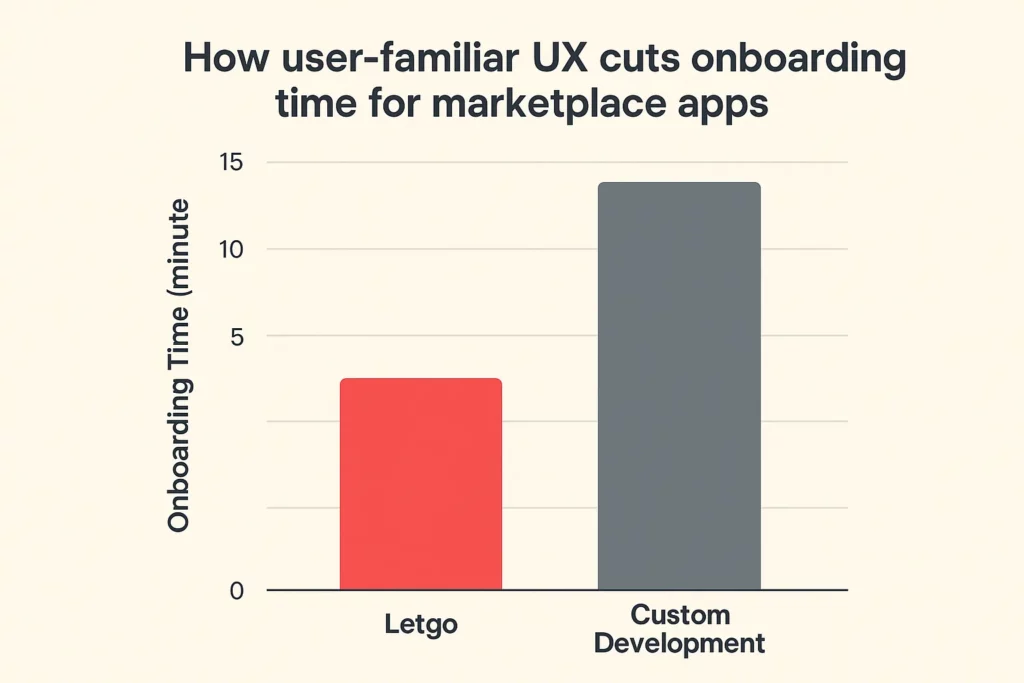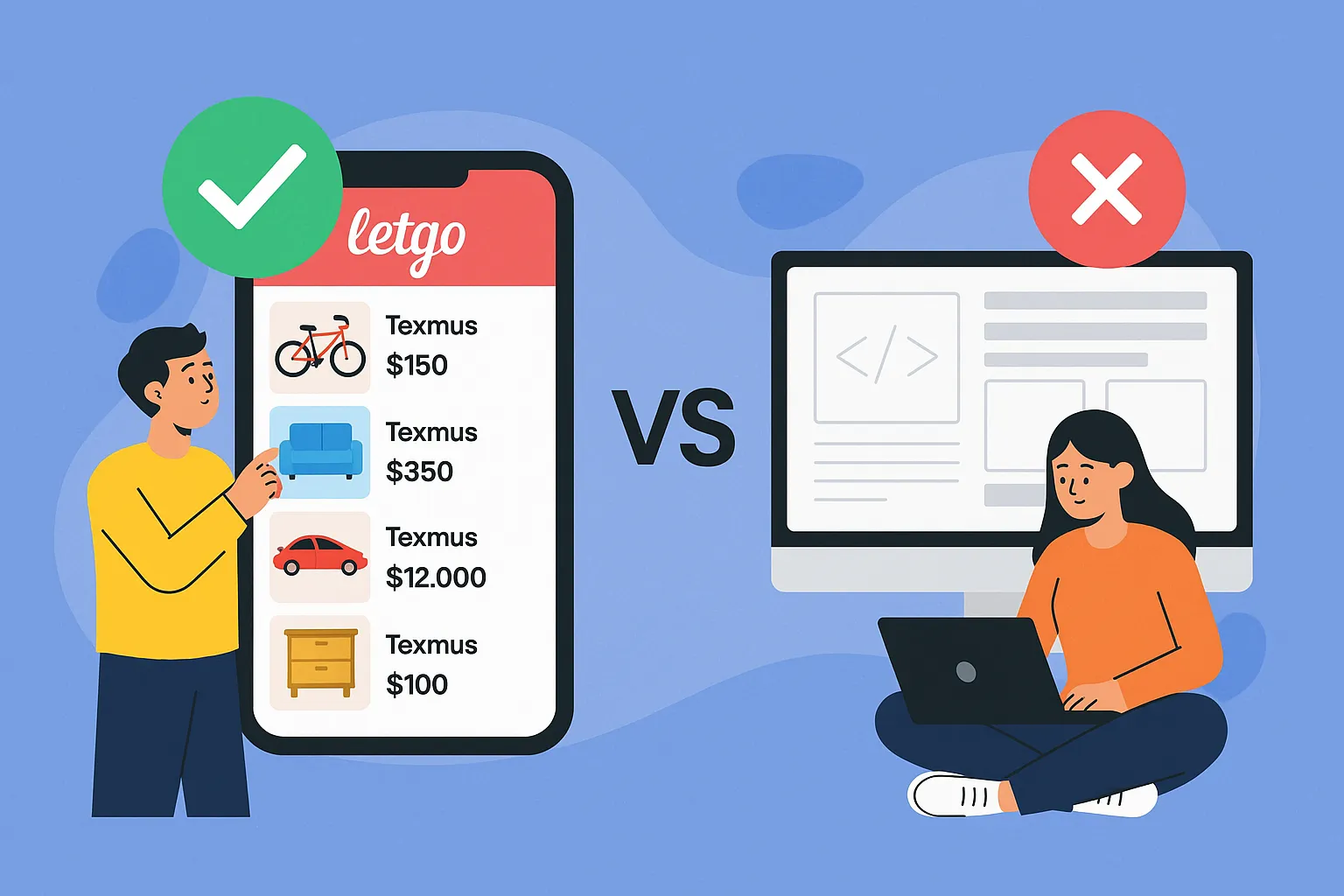Ever tried to sell that designer jacket you swore you’d wear more than once, Letgo clone only to realise it’s been chilling in your wardrobe longer than your crypto? You snap a pic, pick a cheeky filter, and—boom—someone in the same city pings you: “Still available?” That instant-gratification loop is why local “buy-sell” marketplaces like Letgo (now part of OfferUp) exploded to 20 million+ monthly users in the US alone .For founders, it’s proof that neighbourhood classifieds didn’t die with newspaper ink—they just moved to smartphones and started doing cartwheels on TikTok.
But here’s the plot twist: building a Letgo-style marketplace from scratch can feel like hosting a garage sale where every item is also a Rubik’s cube. You’ve got payments, location-based search, chat, content moderation, shipping labels, and trust-and-safety workflows—all spinning at once. No wonder so many fledgling teams slip from MVP to “minimum viable panic.” Meanwhile, the global recommerce boom keeps sprinting ahead—so every month spent reinventing these building blocks is a month competitors gobble up your market.
That’s where clone tech steps in. Instead of pouring VC cash into debugging déjà-vu problems, founders are grabbing pre-built, battle-tested frameworks—then layering their secret sauce on top. Today we’ll unpack, how that decision slashes risk and runway burn, and what differentiators you can still flex. Ready to tap into a playbook that’s already shipping listings faster than you can yell “ISO gently-used sofa”? Let’s dive in—Miracuves is waiting in the wings.
What Is Letgo clone ?
Letgo was a popular mobile classifieds app that allowed users to buy and sell secondhand items locally—from furniture and electronics to cars and clothes. Think of it like a modern, mobile-first version of Craigslist, but with better visuals, geo-location features, and built-in chat. Launched in 2015, Letgo became a breakout hit in the U.S. and several other countries, especially because of its simple user experience and “swipe-to-sell” vibe.
In 2020, Letgo was acquired by OfferUp, and its U.S. operations were merged into the OfferUp platform. However, the Letgo model still inspires dozens of regional and niche marketplaces around the world.
How Does Letgo Work?
Letgo worked on a peer-to-peer (P2P) model, enabling people in the same area to connect over used items. Here’s how the core workflow looked:
1. List an Item (Seller)
- Snap a photo (or multiple) of the item
- Add a short title, price, and optional description
- Letgo automatically tagged and categorized listings using AI
2. Browse Items (Buyer)
- Users saw listings based on their GPS location
- Search filters helped refine results (e.g., “under $50,” “within 5 miles”)
3. Chat & Negotiate
- In-app chat allowed real-time questions and haggling
- No need to exchange phone numbers or personal info
Read More : What is Letgo App and How Does It Work?
The Classifieds Gold Rush: Why Founders Love Proven Blueprints
Every tech wave has its claim-jumpers. From Myspace clones social-network experiments to short-form video copy-cats (“shorts,” “reels,” you name it), entrepreneurs mimic what users already understand. Skip the educate-the-market phase? Check. Hit the App Store top-charts quicker? Double-check.

Network Effects in Miniature
Hypernyms like e-commerce platforms thrive on supply-demand loops. But hyperlocal marketplaces tighten that loop: listings, chats, GPS pins, push-notifications. A Letgo Clone ships with the “meronyms” you need—filters, followers, favouriting—so you can juice liquidity from day one.
Micro-Trends You Can Ride
From Gen-Z side-hustles to eco-friendly swapping, second-hand is no longer the hand-me-down stigma your older cousin teased. Instagram stories of thrift flips go viral weekly, nudging fresh cohorts to search “sell PS5 near me.” Build on that momentum rather than coding your own wheels.
The Hidden Costs of Custom-Building a Classifieds Marketplace
| Cost Centre | Custom Build (12-18 mo) | Miracuves Letgo Clone (3-9days) |
| Core Dev Hours | 10,000+ | 1,200 (mainly customisations) |
| QA Cycles | 6 full passes | 2 targeted passes |
| Third-Party Integrations | Start at $50k | Pre-bundled |
| Opportunity Cost | 3 funding rounds | 1 funding round |
Security & Compliance Pitfalls
Custom stacks often overlook image moderation or “buyer-meets-seller” liability screens. One bad listing sends PR spiralling. Miracuves’ clone pipes every upload through AI nudity detection and verifies phone numbers by default—reducing midnight emergencies.
Time-to-Pivot Risk
Markets shape-shift—remember when Letgo merged with OfferUp mid-pandemic? Developers scrambling to bolt on shipping labels after launch felt the pain. A clone gives you modular microservices you can swap like LEGO bricks (pun intended).
Reasons Startups Choose Miracuves’ Letgo Clone
1. Battle-Tested Architecture
Built on a rock-solid Node.js + PostgreSQL spine with optional microservice break-outs for search and chat.
2. White-Label Branding in Minutes
Swap logos, colour palettes, even button shapes—no design hostage situations.
3. Warp-Speed Launch
Average go-live: 45 days, not 450. Storytime: A Turkish startup launched “MojList” (yep, hyponym pun intended) in six weeks and hit 100k listings by month two.
4. Built-in Geo-Search & In-App Chat
Users expect to haggle like it’s WhatsApp. No extra SDKs needed.
5. AI-Powered Image & Text Moderation
Stop dodgy “replica watches” before they surface.
6. Monetisation Modules Ready-Made
Featured bumps, paid ads, subscription lockers—just toggle in admin.
7. Scales on AWS or GCP
Auto-scaling groups handle spike weekends (spring-cleaning fever, anyone?).
8. Continuous Upgrades
Miracuves ships quarterly patch bundles—meaning you inherit new filters, languages, and payment rails without hiring extra devs.
9. Community & 24/7 Support
Early-stage founders don’t sleep; neither does Miracuves’ Slack channel.
Case Story: From Sketch to Series A in Nine Months
Meet ThriftBee, a bootstrapped duo out of Austin. They grabbed Miracuves’ Letgo Clone, re-skinned it with bumble-yellow vibes, and targeted college campuses. Thanks to ready-made dorm-pickup filters and a “textbooks” category, they hit break-even by month five. Investors noticed the retention curve (daily sessions rivalling TikTok in finals week). Their $6 million Series A landed at month nine—before their friends’ custom marketplace even finished alpha.
Emerging Trends & What’s Next
- Video-first listings: Short clips (à la YouTube Shorts) boost trust. Miracuves roadmap has WebRTC snippets on deck.
- AI-generated descriptions turn shaky seller notes into SEO-rich copy.
- Circular-economy badges resonate with eco-minded Gen-Z.
Keep an eye on geofence-based push deals—hyperlocal notifications that feel like Pokémon GO for couch hunters.
According to TechCrunch OfferUp made headlines by raising $120 million and acquiring Letgo, marking a major move in the online classifieds space .
Conclusion :
Marketplace gold-rush? Still on. Your strategic edge? Shipping faster than rivals, iterating smarter, and spending capital on growth—not debugging login flows. At Miracuves, we help innovators launch high-performance app clones that are fast, scalable, and monetisation-ready. Ready to turn your idea into reality? Let’s build together.
FAQs
How “clone” is the Letgo Clone—will my app look identical?
Nope. Think Lego (see what we did there?): same bricks, endless shapes. You control branding, categories, and feature toggles.
Can I integrate my own payment gateway?
Absolutely. The codebase exposes a payment-service layer—plug Stripe, Razorpay, or your in-house wallet without rewriting core logic.
What about future features Letgo never had, like BNPL?
The modular architecture lets you add services (e.g., Klarna API) via microservice adapters. No Frankenstein code required.
Is the clone GDPR/CCPA compliant out of the box?
Yes—privacy policy links, data-deletion endpoints, and analytics anonymisation are pre-wired. You just update legal copy.
How does Miracuves handle scaling if my listings surge overnight?
Auto-scaling groups on your chosen cloud spin up extra pods; a caching layer keeps search snappy.
Do I need Miracuves for every little tweak after launch?
Nah. Your devs get full source code. Use Miracuves for major version upgrades or advanced modules, but day-to-day tweaks are all yours.
Related Article :








